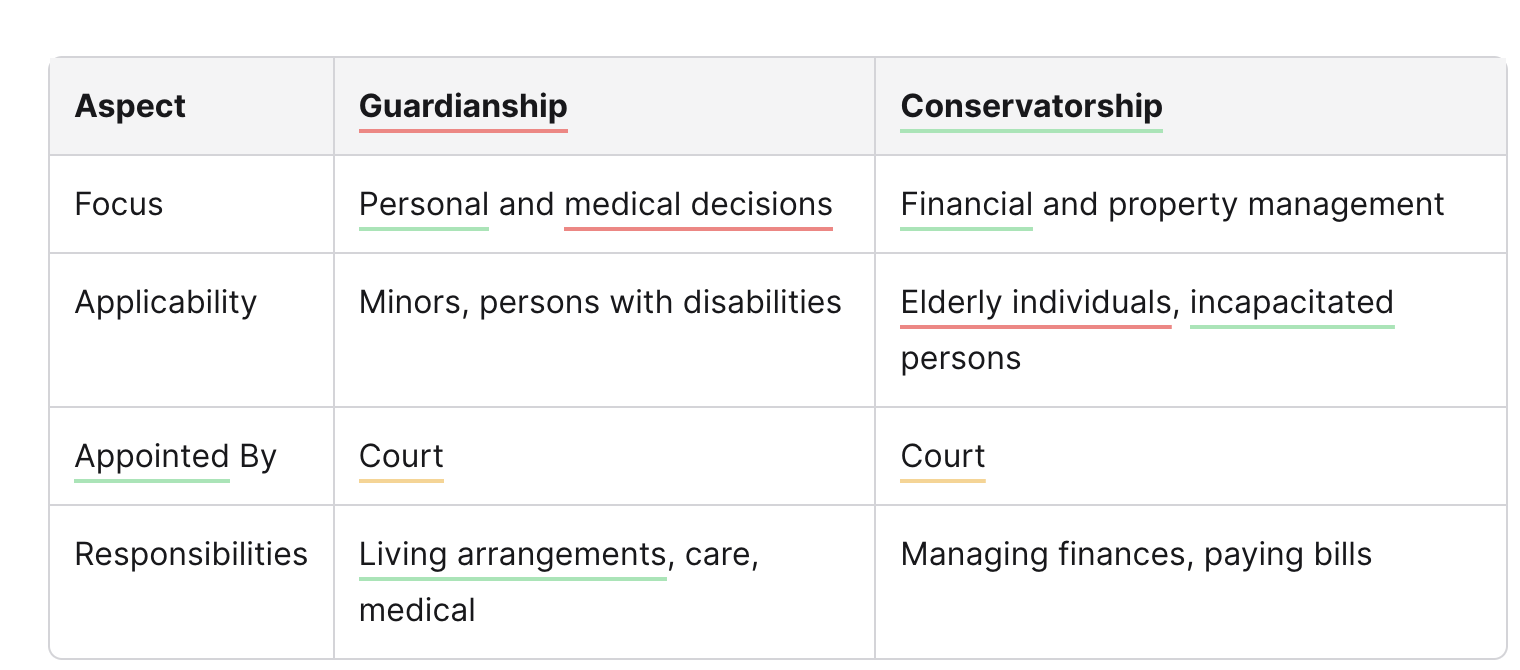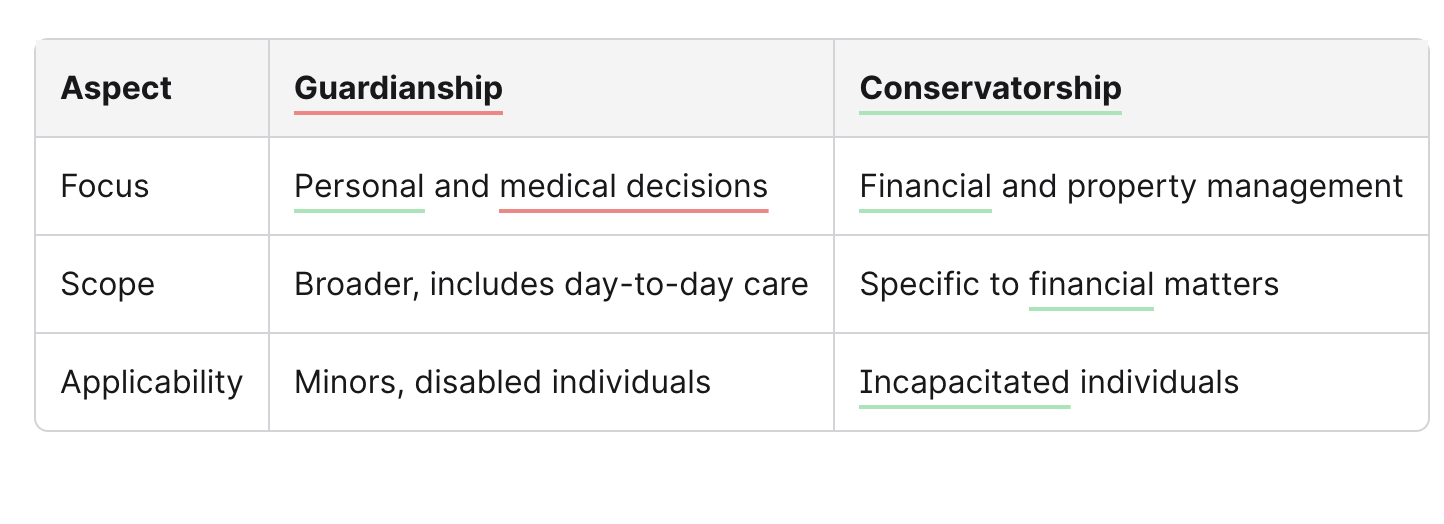Guardianship and conservatorship are two legal mechanisms designed to provide care and decision-making authority for individuals who cannot manage their own affairs due to age, incapacity, or other limitations.
While these terms are often used interchangeably in some jurisdictions, they have distinct meanings and applications.
In the Indian context, these arrangements are critical in estate planning, particularly for minor children, elderly individuals, and persons with disabilities.
This article explores the concepts of guardianship and conservatorship, their legal framework in India, and their implications for estate planning.
What Are Guardianship & Conservatorship?
Guardianship
Guardianship is a legal arrangement where a court appoints a guardian to make personal, medical, and day-to-day decisions for an individual (the ward) who cannot do so independently.
This is often applicable to minor children or individuals with developmental disabilities.
Conservatorship
Conservatorship, though less formally recognised in India, typically involves the appointment of a conservator to manage the financial and property-related affairs of an incapacitated individual.
In the Indian context, conservatorship overlaps with guardianship laws in scope and application.

Legal Framework For Guardianship & Conservatorship In India
India’s legal system primarily addresses guardianship through various statutes, while conservatorship is often addressed indirectly through related laws.
1. Guardians and Wards Act, 1890
- Applies to the appointment of guardians for minors and certain incapacitated individuals.
- The court oversees the guardian's responsibilities and the ward's welfare.
2. Mental Healthcare Act, 2017
- Provides a framework for the care and guardianship of individuals with mental illnesses, including Alzheimer’s disease.
3. Rights of Persons with Disabilities Act, 2016
- Focuses on individuals with developmental disabilities, enabling guardianship for their financial and personal needs.
4. Hindu Minority and Guardianship Act, 1956
- Governs guardianship for minor children under Hindu personal laws.
When Is Guardianship Or Conservatorship Required?

Guardianship
- For minors whose parents are deceased or incapacitated.
- For individuals with developmental disabilities requiring assistance with daily life.
- For elderly individuals unable to make personal care decisions.
Conservatorship
- For managing financial affairs of incapacitated individuals, such as those with dementia or brain injuries.
- For elderly individuals who need help with managing assets and paying bills.
Types of Guardianship & Conservatorship
Guardianship
- General Guardianship: Comprehensive authority over the ward's personal and medical decisions.
- Temporary Guardianship: Short-term authority during emergencies or specific situations.
- Guardian ad Litem: Court-appointed guardian for legal proceedings to represent the ward’s best interests.
Conservatorship
- General Conservatorship: Broad authority over the conservatee's financial matters.
- Limited Conservatorship: Authority restricted to specific financial areas.
How Are Guardians Or Conservators Appointed?
- Filing a Petition
- A concerned family member or interested party files a petition in the family court or relevant jurisdiction.
- Court Hearing
- A judge evaluates the proposed guardian or conservator’s suitability, often based on the individual’s needs and circumstances.
- Appointment
- The court appoints the guardian or conservator, specifying their powers and responsibilities.
Responsibilities Of Guardians & Conservators
Guardians
- Arranging suitable living conditions for the ward.
- Overseeing medical care and treatment decisions.
- Ensuring the ward’s basic needs are met.
Conservators
- Managing financial affairs such as paying bills, filing taxes, and overseeing investments.
- Safeguarding the conservatee’s assets.
- Making financial decisions in the conservatee’s best interests.
Guardianship & Conservatorship In Estate Planning
1. Guardianship for Minor Children
- Parents often designate guardians for their minor children in their Wills.
- This ensures continuity of care in the event of the parents’ demise.
2. Conservatorship for Elderly Family Members
- For elderly individuals with limited capacity, conservatorship ensures their financial stability and proper asset management.
3. Durable Power of Attorney
- A durable power of attorney can act as a preventive measure, allowing individuals to designate trusted agents to manage their affairs, reducing the need for court-appointed conservators.
Challenges & Limitations
1. Court Supervision
- Both guardianship and conservatorship require court oversight, which can be time-consuming and expensive.
2. Family Disputes
- Disagreements among family members regarding the appointment of a guardian or conservator can lead to legal battles.
3. Mismanagement Risks
- A guardian or conservator’s mismanagement of responsibilities can harm the ward or conservatee.
Key Differences Between Guardianship & Conservatorship

Guardianship & Conservatorship For Elderly Individuals
Why It’s Needed
- Rising instances of dementia and Alzheimer’s disease necessitate legal frameworks to protect elderly individuals.
Key Considerations
- Appointing trusted family members or professionals.
- Ensuring proper financial management and personal care.
Legal Tools To Supplement Guardianship & Conservatorship
- Power of Attorney
- Grants authority to a trusted individual to manage financial and medical decisions.
- Living Wills
- Specify medical care preferences, reducing the need for guardianship.
- Trusts
- Protect assets and ensure their proper use for the benefit of the individual.
Notable Global Practices
United States
- Conservatorship is widely used, with states like California implementing robust frameworks, such as the Lanterman-Petris-Short (LPS) Conservatorship for individuals with mental health conditions.
India
- Guardianship laws focus more on minors and individuals with disabilities. The concept of conservatorship is less formalised.
The Bottom Line: How Yellow Can Help

Guardianship and conservatorship are vital tools for protecting the interests of individuals who cannot manage their affairs.
While guardianship primarily addresses personal and medical decisions, conservatorship focuses on financial management.
In the Indian context, integrating these concepts into estate planning ensures the well-being of vulnerable individuals and provides peace of mind for their families.
By leveraging tools like Wills, Powers of Attorney, and Trusts, families can reduce the need for court intervention and safeguard their loved ones’ futures.
Proper planning, clear communication, and adherence to legal frameworks are essential to making these arrangements effective and beneficial.
At Yellow, we can help you with all aspects of estate planning, including Wills, Trusts, Powers of Attorney, Gift Deeds, Legal Heir and Succession Certificates, and Living Wills. We also offer post-demise and asset transfer services. Our team of legal experts has more than 50 years of combined experience.




